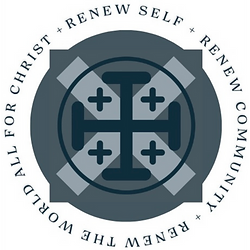The Church of
St. Andrew the Apostle

Where everyone is welcomed, celebrated & transformed by the Holy Spirit to reflect Hope, Faith & Love in the world.
The core beliefs of St. Andrew the Apostle reflect our faith in God as revealed through Scripture, the teachings of Jesus Christ, and in the traditions of the church. Simplistically, we believe in the Holy Trinity — Father, Son, and Holy Spirit — and affirm Jesus Christ as our Savior and Lord. Grounded in prayer, worship, and the sacraments, our faith calls us to love God, serve others, and live as disciples in the world. Committed to the faith as it has been passed down to us, we seek to grow spiritually by doing justice, loving mercy and walking humbly with our God (Micah 6:8). The following core beliefs shape our mission, our worship and our community.
Biblical. At St. Andrew’s, we believe in the authority, wisdom, and transformative power of Scripture as the foundation of our faith. The Bible is God’s Word, guiding us in truth, shaping our beliefs, and directing our daily lives. Through prayerful study and reflection, we seek to grow in understanding, apply its teachings, and live out its call to love, justice, and discipleship. As a biblical church, we are committed to preaching, teaching, and living according to God’s Word, trusting it to reveal His will and purpose for our lives.
Creedal. We affirm the historic creeds of the Church — the Apostles’ Creed and the Nicene Creed — as foundational expressions of our faith. These creeds connect us to the broader Christian tradition, uniting us with believers across time and place in proclaiming the core truths of our faith. They affirm our belief in the Triune God—Father, Son, and Holy Spirit—and in Jesus Christ as our Savior and Lord. As a creedal church, we uphold these statements as guides for our worship, teaching, and daily discipleship, grounding us in the unchanging truths of the Gospel.
Confessional. We are a confessional church, meaning we openly affirm and uphold the faith handed down through the Reformation heritage of the Anglican Communion. We recognize the historic traditions of the Christian faith, particularly the Creeds, as well as the rich theological heritage found within the Book of Common Prayer, and the Thirty-nine Articles of Religion. Being confessional means we stand in continuity with the Church throughout history, acknowledging our faith not only in personal belief but also in communal declaration. Through our worship, teaching, and daily lives, we seek to live out these confessions with integrity, bearing witness to the truth of the Gospel.
Liturgical. We believe in the sacred liturgical rhythms of the church, meaning our worship is shaped by the common prayers and sacraments of the Anglican Communion. As an Anglican community, we follow the Book of Common Prayer, which guides our prayers, Scripture readings, and sacraments, uniting us with believers across generations and around the world. Our liturgical worship is rooted in Scripture, rich in meaning, and centered on the Eucharist, drawing us deeper into God’s presence. Through our liturgical life, we seek to honor God, grow in faith, and participate in the life of the Church in a way that is both reverent and transformative.
Sacramental. We are sacramental church, recognizing that God’s grace is made visible and tangible through ritual actions done within the community. As an Anglican church, we uphold Holy Baptism and the Holy Eucharist as the two great sacraments instituted by Christ, while also honoring the other sacramental rites of the Church. Through the sacraments, we encounter God’s presence, receive His grace, and are strengthened in our faith. They are outward signs of an inward spiritual reality, drawing us deeper into communion with Christ and one another. As a sacramental church, we embrace these sacred mysteries as central to our worship, spiritual growth, and daily discipleship.
Evangelical & Catholic. We embrace both our evangelical and catholic heritage, holding together the authority of Scripture and the rich traditions of the Church. As evangelical, we are committed to sharing the Good News of Jesus Christ, the power of God’s Word, and the call to personal faith, discipleship, and mission. As catholic, we affirm our connection to the universal Church that is not defined by denominational style, but of the faith the apostles handing down to the generations. This balance allows us to worship, serve, and grow in faith with both a deep reverence for tradition and a passion for sharing the Gospel.
Apostolic. We hold to the Apostolic Tradition of the Church, meaning our faith is rooted in the teachings and mission of the apostles, handed down through the generations to us. The faith handed down is guided by Scripture, the creeds, and the sacramental life of the Church. As part of this unbroken witness, tangibly seen within the episcopacy, we are called to proclaim the Gospel, make disciples, and serve as Christ’s hands and feet in the world. Our apostolic identity connects us to the Great Commission of the Church, ensuring that the faith we have received continues to be faithfully lived and passed down to the next generation.